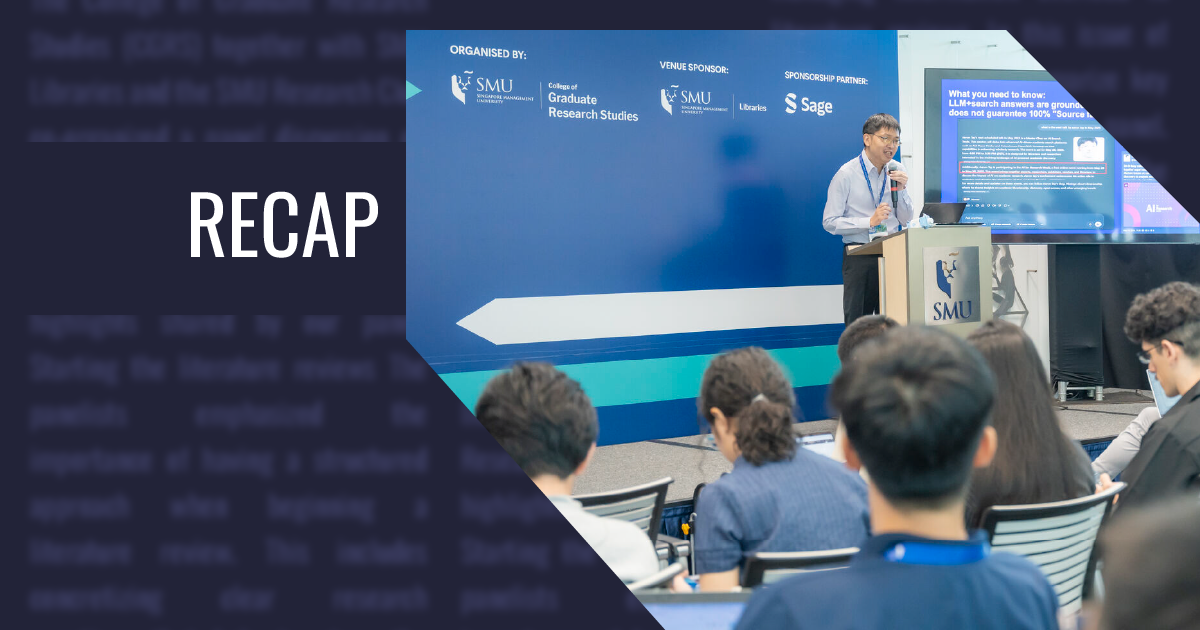
By Aaron Tay, Head, Data Services
Librarians from SMU Libraries' Research & Data Services were invited to present at SMU's College of Graduate Research Studies (CGRS) during the Singapore Rising Scholars event, which takes place from 15 to 16 May 2025.
This is the second time we have been invited to present, and here are some highlights from the presentations we gave.
Seminar 1: Academic Literature Review in the Age of AI and Large Language Models
This is the second run of the same topic, and it remains popular among researchers at the Rising Scholar Conference.
Compared to last year, the focus is now on agentic deep search, and I shared how popular agentic search tools like Undermind.ai (subscribed by SMU) have been among researchers of all levels at SMU due to their ability to produce high-recall search results, albeit with a trade-off in waiting time.
The rise of "Deep Research," where tools extend beyond basic RAG (Retrieval Augmented Generation) features of generating short paragraphs of text to producing page-long reports, is yet another exciting development worthy of attention.
Seminar 2: Streamlined Workflow for Qualitative Data Analysis with Whisper and ATLAS.ti
Here, Bryan Leow and I (presenting on behalf of a colleague) gave an updated version of our talk from last year on the use of auto speech translation tools and thematic coding.
Compared to last year, LLMs like Gemini 2.5 Pro have improved significantly and can perform speaker diarisation (segmenting audio speech by speaker) natively. They may be worth considering over OpenAI's Whisper, although we always caution about the privacy implications.
An audience member shared some interesting tools he was using for auto speech recognition and also suggested a potentially interesting use of Google NotebookLM for this.
Seminar 3: Getting Published and Enhancing Research Visibility with Visual Abstracts
Here, my colleagues Yeo Pin Pin and Dong Danping presented techniques for enhancing your research visibility.
This year, Danping spoke again about the art of creating visual abstracts (sometimes known as graphic abstracts) and the service SMU Libraries offers (conditions apply). With text-to-image generation advancing so rapidly, are we close to being able to generate visual abstracts simply by uploading a paper and providing a prompt?
Danping found that while the current generation of AI systems is much better than it was even a year ago at generating images with text, they still often make spelling errors, and the visual design remains somewhat basic. However, it is highly likely that we will soon be using future iterations of these systems to generate visual abstracts.
Seminar 6: Text Analysis for PhD Research: An Introduction to No-Code and Code-Light Tools
A new webinar where Danping and I shared some text analysis tools that we have been using.
I presented lightweight no-code tools like Voyant and TALL, but I highlighted their limitations, such as the lack of stemming or lemmatization, and how these tools typically employ traditional bag-of-words techniques like LDA for topic modelling rather than more advanced transformer-based techniques.
Danping further shared her experiences using the Python library BERTopics for clustering text. She provided a high-level overview of the different components of the library and emphasised the highly modular nature of BERTopics. She also pointed out that someone with basic knowledge of Python (possibly with the help of LLMs) could easily use and interpret the results.

Additionally, I managed to attend Panel Session 2: Comprehensive Applications of AI in Social Science: From Research Design to Data Analysis and gained valuable insights from the highly engaging panellists - Professor Roy Lee, Professor Hannah Chang, and Professor Richard Crowley.
Conclusion
This is the second time that SMU Libraries have been invited to present at CGRS's Singapore Rising Scholars, and like last year, we enjoyed the back-and-forth interaction with rising scholars both during the sessions and afterwards. We made some valuable connections and leads, and we hope to return next year.